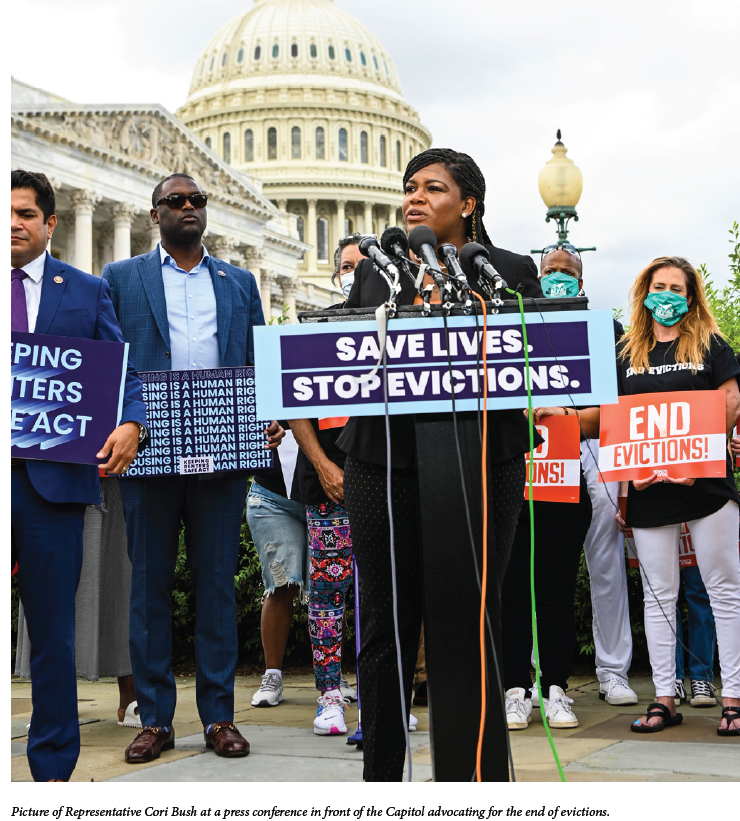Updates on the “Build Back Better Act”
Note: given the fast-changing nature of the legislative process, some information in this article may be outdated by the time of publication.
The “Build Back Better Act,” President Joe Biden’s landmark social spending and economic recovery legislation, has faced a long, winding road to enactment. The $1.75 trillion package includes over $150 billion in affordable housing and community development investments, including significant funding for NLIHC’s HoUSed campaign’s top priorities:
- $25 billion to expand housing vouchers to more than 300,000 households with low incomes;
- $65 billion to make desperately needed repairs to public housing and improve living conditions for its 2.5 million residents; and
- $15 billion for the national Housing Trust Fund to build and preserve over 150,000 affordable, accessible homes for households with the lowest incomes.

To enact the legislation, Congressional Democrats are using a process called “budget reconciliation,” which allows a bill to pass the Senate with a simple majority of 51 votes rather than the 60 votes typically required in the chamber. Even when using budget reconciliation, though, every single Democratic senator needs to vote in favor of the bill if it is to be enacted in an evenly split Senate.
The House of Representatives voted on November 19, 2021, to approve the Build Back Better Act by a near party-line vote of 220-213, but the bill has faced steep hurdles in the Senate. After months of discussions, West Virginia Senator Joe Manchin, a Democrat, declared in December 2021 that he would not support the historic recovery package as it is currently written, effectively killing the bill.
In consequence, President Biden confirmed during a January 2022 press conference that the White House would embark on a new strategy to advance and enact a scaled-down version of the act that would only include provisions that can garner the support of all Senate Democrats. Parts of the bill not making it into the scaled-back version could be repackaged into smaller bills that would need to move through regular order in the Senate, requiring support from all Senate Democrats and at least 10 Senate Republicans. Given the difficulty of moving legislation through regular order and the limited floor time available during an election year, these smaller bills would have virtually no chance of being voted into law this year.
NLIHC is urging advocates to continue contacting members of Congress to demand they protect and advance the bill’s historic investments in housing vouchers, public housing, and the Housing Trust Fund. It is crucial that these provisions make it into any final reconciliation bill that is brought forward in the Senate. With homelessness on the rise, rents increasing across the country, and households still struggling to make ends meet, we cannot let Congress miss this opportunity to make historic investments in affordable housing programs targeted to households with the lowest incomes.
Updates on Fiscal Year 2022 Appropriations
Note: given the fast-changing nature of the appropriations process, some information in this article may be outdated by the time of publication.
 The annual appropriations process is an essential task completed by Congress every year to ensure the federal government and all its vital programs continue to operate. Congress is tasked with enacting a new budget by October 1, which marks the beginning of the new federal fiscal year, but it rarely meets this deadline. Instead, Congress typically enacts a short-term continuing resolution (CR), which briefly extends federal government funding at its current level, buying Congress more time to finalize its spending bill for the new fiscal year.
The annual appropriations process is an essential task completed by Congress every year to ensure the federal government and all its vital programs continue to operate. Congress is tasked with enacting a new budget by October 1, which marks the beginning of the new federal fiscal year, but it rarely meets this deadline. Instead, Congress typically enacts a short-term continuing resolution (CR), which briefly extends federal government funding at its current level, buying Congress more time to finalize its spending bill for the new fiscal year.
This year’s appropriations process has been no different. The House Appropriations Committee voted in July 2021 to approve a draft spending bill that would provide $56.5 billion for the Department of Housing and Urban Development (known as “HUD”) – an increase of $6.8 billion from the previous fiscal year, including funding for an expansion of housing vouchers to an additional 125,000 households. However, progress has stalled in the Senate.
Without a finalized appropriations bill for fiscal year 2022 (FY22), Congress has passed a series of short-term CRs to buy more time for appropriators to reach an agreement. The most recent CR passed in December 2021 and extended the appropriations deadline to February 18, 2022. Meanwhile, in mid-October 2021, the Senate Appropriations Committee released its funding proposal for FY22. The proposal would provide $53.4 billion for HUD and does not contain the major expansion of housing vouchers included in the House bill.
With both the House and Senate proposals released, Congressional appropriators have set about negotiating a final spending package with the aim of pushing the bill through both the House and Senate. Negotiations began on shaky ground but reportedly improved, with both Democrats and Republicans on the House and Senate Appropriations Committees expressing optimism about the progress made. Still, it appears unlikely Congress will meet its February deadline, so there will likely be another CR passed extending the process into mid-March.
You can add your organization to a sign-on letter urging Congress to invest in affordable housing and community development programs in fiscal year 2022. For more information, contact Kim Johnson at [email protected]

Inside and Outside the Halls of Congress, Representative Cori Bush Pushes to Prevent Evictions
On the eve of the expiration of the federal eviction moratorium in July 2021, Representative Cori Bush (D-MO) did something unconventional: she took to the steps of the Capitol and camped out overnight. At the time, more than 11 million people were behind on rent, the Delta variant had ignited a new wave of COVID-19 infections, and distribution of emergency rental assistance was still slowly ramping up. As the expiration date approached, Representative Bush and some of her colleagues pressed for a further extension of the moratorium to stave off a wave of mass evictions – but legislation to extend the moratorium did not have the votes necessary to pass in either chamber. The Biden administration felt its hands were tied, and a recent Supreme Court ruling indicated that a majority of the justices would overturn another extension of the moratorium unless Congress passed a bill explicitly authorizing it.
As the House of Representatives adjourned for August recess on the evening of July 31, Representative Bush – who has personally experienced homelessness – brought a chair and a sleeping bag to the Capitol steps to protest the inaction of Congress and the Biden administration. Through heavy rain and summer humidity, the protest ultimately lasted four nights, with dozens of House and Senate Democrats – as well as hundreds of activists – showing up in support.
“I know what it’s like to sit up restless as my babies sleep in the car, doing everything I can to keep them warm as the sun goes down,” said Representative Bush recently about her protest. “I know what it’s like to wonder when that knock on the door is going to come next, telling us to pack up and leave. Evictions can be a death sentence in this country. When we saw that Congress was going to leave for vacation while thousands of evictions were set to be carried out, we refused to accept this as our reality.”
Finally, on August 3, the Biden administration reinstated a two-month eviction moratorium that would apply to counties experiencing “high” or “substantial” community spread of COVID-19 – the vast majority of the United States at the time. Two weeks later, however, the Supreme Court invalidated that moratorium and evictions resumed.
“Last summer’s movement on the Capitol steps was a movement of, for, and with the people,” said Representative Bush. “It was a movement to save lives and make clear that housing is a human right, and that protecting the dignity of every person is at the center of our policymaking. Thank you to the National Low Income Housing Coalition for helping lead the charge with data-driven solutions, and for continuing to put this conversation where it belongs: at the top of the national agenda. We will not give up, because the people must win.”
Since ending their protest on the Capitol steps, Representative Bush and her colleagues have continued to push for Congress to reinstate a nationwide eviction moratorium. Representative Bush and Senator Elizabeth Warren (D-MA), along with three dozen other members of Congress, introduced the “Keeping Renters Safe Act” (S. 2776/H.R. 5307) in September 2021. The bill would enact a federal eviction moratorium for nonpayment of rent that would last for the duration of the COVID-19 public health emergency and at least two months following the end of the emergency declaration. The moratorium would apply to eviction filings, hearings, judgments, and executions of judgments. Rather than require applications, the moratorium would automatically cover all renters. The bill would also clarify the authority of the Secretary of the Department of Health and Human Services to implement a residential eviction moratorium to address public health crises.
The Keeping Renters Safe Act affirms what renters know to be true: that stable housing is an essential part of public health. The bill would enable Congress and the administration to overcome the Supreme Court’s objections to the eviction moratorium, paving the way for much-needed protections during the current crisis and in the event of future emergencies.

Election 2022: Congress Works to Boost Voting among Renters
Representatives Jesús “Chuy” García (D-IL) and Mary Gay Scanlon (D-PA) introduced H.R. 2215, the “Our Homes, Our Votes Act,” on March 26, 2021. The bill aims to boost voter registration among residents of federally subsidized housing by allowing them to register to vote when they sign their lease. The bill has 31 cosponsors.
The Our Homes, Our Votes Act would alter the “National Voter Registration Act” (better known as the “Motor Voter Law”) by adding a requirement that landlords in many properties make voter registration available to people during an important transition: when they change their address and move into a new property. In particular, the bill would:
- allow eligible and interested tenants in subsidized housing administered by a public housing agency (PHA) to register to vote as they sign their lease document without requiring that they provide duplicate information, meaning that they would not have to fill out additional paperwork to become voters at their new addresses.
- require PHA’s to transmit these voter registration forms to local election authorities in a timely manner.
- designate private landlords of subsidized housing as “voter registration agents” responsible for distributing voter registration forms and helping tenants fill them out if needed. The designation would cover landlords of properties that receive funding through the Low Income Housing Tax Credit program, the HOME program, the national Housing Trust Fund, the USDA’s rural housing programs, and others.
Crucially, the bill would make clear that federally subsidized housing providers are expected to conduct voter registration activities at lease-up. Census data show large discrepancies in registration and voter turnout between low- and high-income voters and between renters and homeowners. While 88% of people with incomes of more than $150,000 were registered to vote in 2020 and 85% of this group voted, just 66% of people with incomes of less than $30,000 were registered to vote and only 56% voted.
One of the most common reasons renters do not vote is that they have recently moved and have not updated their registrations. The new law would reduce that barrier. Contact your members of Congress and urge them to support this essential addition to the Motor Voter Law. Pass the Our Homes, Our Votes Act today!